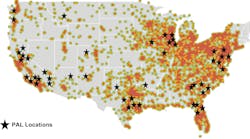High diesel prices and the uncertain costs of meeting 2007 diesel emissions requirements shouldn't derail the trucking industry's current robust economic growth, but a shortage of drivers could, according to a panelist speaking at the International Trucking Show.
California-based GI Trucking has experience two years of double-digit growth and expects it to continue at that rate for the next few years, according to its president, William Reid. Problems with 2002 engines have “not impacted us as greatly as we once feared, our customers have more readily accepted rate increases as capacity is failing to keep up with demand, fuel surcharge revenue has increased along with increased fuel prices…trucking companies are more profitable as conditions in the industry have swung in our favor,” he said.
While “cautiously optimistic” that continued high fuel prices can be recovered in rates, Reid said his real concern about limits on future growth was the fleet's inability to “find enough qualified truck drivers and truck technicians to operate and maintain the equipment in our fleet.”
As for the 2007 emissions regulations, Reid said, “It's critical that I know ahead of time as much as possible about new engine technologies and how they will impact the ways we operate.”
Increasing demand for freight services, the growing importance of supply chains as competitive differentiators, customer demands for higher quality services and new global opportunities all offer truck fleets near-term opportunities for growth, according to Keith Lovetro, the president and CEO of FedEx Freight West.
In order to take advantage of those opportunities, though, trucking will have to “create a supply of qualified drivers,” Lovetro said. “As an industry we need to create more awareness that trucking is a good place to make a living.”
Lovetro said that future growth will also require increasing truck productivity through higher gross vehicle weights or longer combinations Looking at the current “robust truck market,” Mark Lampert, sr. vp of sales and marketing for Freightliner Trucks, said the outlook for continued strong economic performance was positive for 2005 and 2006.
However, he, too, pointed to drivers putting a brake on growth: “Whenever this industry and the economy grow, we seem to run out of drivers to move the freight.”
That shortage “is being further exacerbated by the dwindling number of owner operators” hurt by spikes in fuel, insurance and health care costs, Lampert said.
Focusing on the impact of 2007 emissions, Gary M. Parsons, N.A. commercial automotive business unit manager for ChevronTexaco Global Lubricants predicted that “capital costs, operating costs and maintenance costs will all likely increase as a result of the new regulations.”
While “the exact costs are unknown at this time,” Parsons added that resulting change to “ultra clean” diesel engines also offered “a great opportunity to improve the public's perception of the diesel engine and the trucking industry.”


